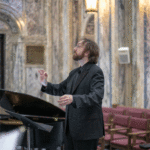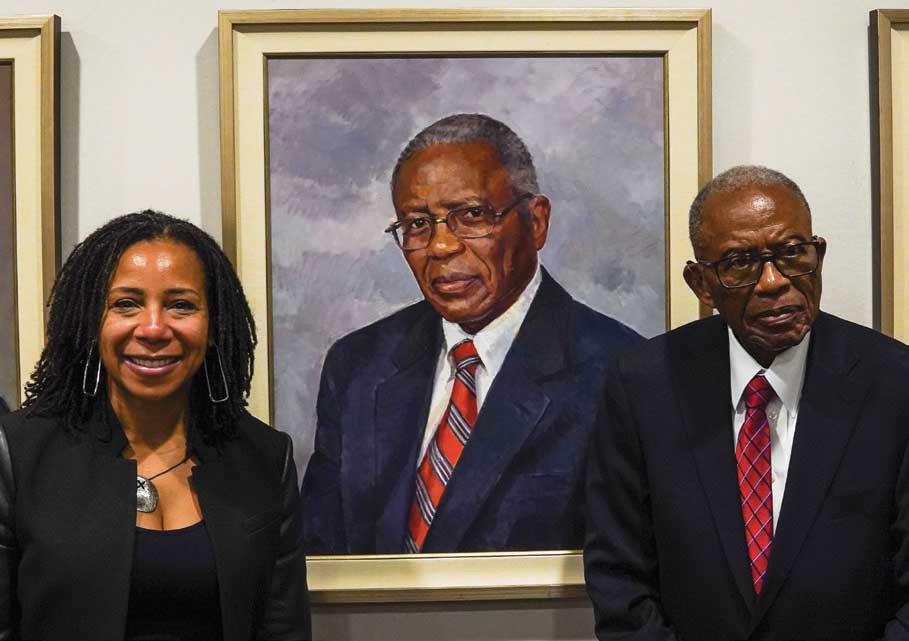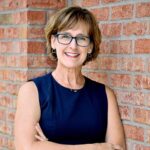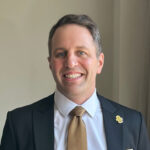
The defense won’t rest: Law professor takes powerful strides forward in the sometimes-isolating work of antiracism and social justice advocacy

Google the name “Ayesha Bell Hardaway” and you’ll find this 1997 College of Wooster grad everywhere. She’s in video clips offering legal analysis for news programs, her name appears in the byline of scholarly articles, and so on. But ask her about her work in antiracism and advocacy for the marginalized and the oppressed, and she’ll tell you it feels like she’s on an island … and that there’s a lot of work to be done.
After majoring in sociology and minoring in Black studies at Wooster, Hardaway went on to study at Case Western Reserve University (CWRU) School of Law. Almost 20 years later, she’s now an associate professor at the same institution. As a law student, she recalls rarely having the opportunity to talk about how race has been used in the creation, exploration, and analysis of laws in America. As a professor, she’s determined to change this using her research, teaching, and administrative responsibilities. Hardaway serves as co-director of the Social Justice Institute, director of the Criminal Defense Clinic, and director of the Social Justice Law Center. Each of these venues brings different opportunities to help CWRU’s mostly white population of students explore race and the law.
“The SJL Center has been working really hard to increase curricular offerings so students can discuss race without having to be so lucky to have the one Black woman on faculty,” said Hardaway. “We also bring in diverse scholars from across the country to help inspire and inform students.”
Fred Gray is one of the scholars who gets invited back to campus regularly. He’s a 1954 law school grad who went to Case because none of the schools in his home state of Alabama would admit a Black student. Gray went on to play critical roles in several civil rights cases, including those of Rosa Parks and Martin Luther King Jr., and was elected president of the Alabama State Bar Association in 2001.

Fred Gray, a 1954 CWRU alumnus, famously represented Rosa Parks and Martin Luther King Jr. Hardaway’s Social Justice Law Center invites him to speak frequently at Case Western. Gray last spoke on campus in fall 2021. Photo: Brandon Burkey ’18
In her Criminal Defense Clinic, Hardaway teaches third-year law students how to handle their own criminal misdemeanor cases. From her perspective, she’s doing anti-racism work in tandem with teaching the fundamentals of criminal representation. “Regardless of economic status, if you go to any of our courts in Cleveland, you’d find that the defendants disproportionately are Black,” said Hardaway. “If you carve out the ones who are eligible to be represented by my clinic because they can’t afford their own lawyers, it’s even higher.”
“Those who have always held onto power can’t imagine a more equitable or a more just society because for them it’s perfect the way that it is.”
—Ayesha Bell Hardaway ’97
The clinic gives Hardaway an opportunity to talk to students about what targeted policing and selective prosecution looks like—especially in communities of color. She argues that this is why more Black people find themselves as defendants from a very early age and all through their lives. It’s a conversation that didn’t get much attention before she arrived on campus in 2012.
“I don’t know how you do this work without talking about race, and it’s problematic if I’m the only one talking about it,” emphasized Hardaway. “I’m intentionally making the case to help students understand the reality they’ve never had to deal with.”
Hardaway also plays a key role that could improve local policing. In 2015, she was invited to serve on the Independent Monitoring Team appointed to evaluate Cleveland police reforms under a federal consent decree and in 2018 was promoted to deputy monitor of the team. The team consists of many experts connected to President Obama’s Task Force on 21st Century Policing, and specifically sought Hardaway’s Cleveland roots and legal expertise. Coincidentally, the federal judge assigned to enforce the implementation of the reforms is College of Wooster Emeritus Life Trustee, Judge Solomon Oliver Jr. ’69.
“I first met Judge Oliver when I was 16 and considering Wooster. He and his wife hosted an event for prospective students at their home.” recalled Hardaway. “He served as a mentor of mine for a long time.”
Outside of the law school and law enforcement bubbles, Case Western’s Social Justice Institute provides support for faculty and grad students interested in looking at research and devising solutions to remove oppression and promote liberation. Hardaway found a source of belonging and community here for her own scholarship—something she honed in on well before teaching law students.
“Wooster’s Black studies minor was aligned with my own intellectual curiosity and desire to learn more about the experiences of my people in this country,” said Hardaway. “My Independent Study project on professional women’s attitudes toward affirmative action also helped me gain some initial contact in terms of the legal world.” Hardaway recognizes how others can benefit from the same insights she did within her work at Case Western.
The Institute’s ongoing work to demand for police accountability and racial justice intensified following the killing of George Floyd and the awareness of what happened to Breonna Taylor and Ahmaud Arbery. “We had no idea the world was going to blow up,” said Hardaway, who assumed the role as the Institute’s co-director shortly before the incident. “The Institute has university-wide commitment to integrating and supporting social justice research and teaching across all eight schools on campus.”
Hardaway’s collective advocacy efforts have not gone unnoticed. In December, the Ohio State Bar Foundation awarded Hardaway $50,000 to provide fellowship funding this summer to CWRU law students interested in doing racial justice work. She hopes victories like these—and her ongoing work in research, scholarship, and administrative roles—will build understanding of the systems that lead to disproportionate realities and deep levels of oppression and can help generate solutions that have a lasting impact locally and across the country.
“I worry about how much our country repeats itself historically, and that when we’re on the precipice of great moments of progress, we cleave with everything that’s in us to what is most comfortable for the unimpacted,” said Hardaway. “Those who have always held onto power can’t imagine a more equitable or a more just society because for them it’s perfect the way that it is.”
Attending Wooster as a Black student wasn’t always comfortable for Hardaway, but she knows it helped her figure out who she is and what she wants to contribute in her time on Earth. She’s also grateful for everything the College has given her family. “My son, Najee, is there now and making it his own,” boasted Hardaway. The senior basketball standout is poised to graduate this spring. “I never imagined I would have a child who loved Wooster as much as I do, but he might love it even more.”
Posted in Alumni on March 1, 2022.
Related Posts
Related Areas of Study
Sociology
Closely affiliated with the Anthropology program, sociology majors at The College of Wooster take core courses in research methods and theory.
Major MinorPre-Law
Plan for your future in law with faculty mentors who have guided generations of Wooster graduates to law school
Pre-Professional AdvisingAfricana Studies
An interdisciplinary approach to interpreting the lives and experiences of the world's Black women and men.
Major Minor

